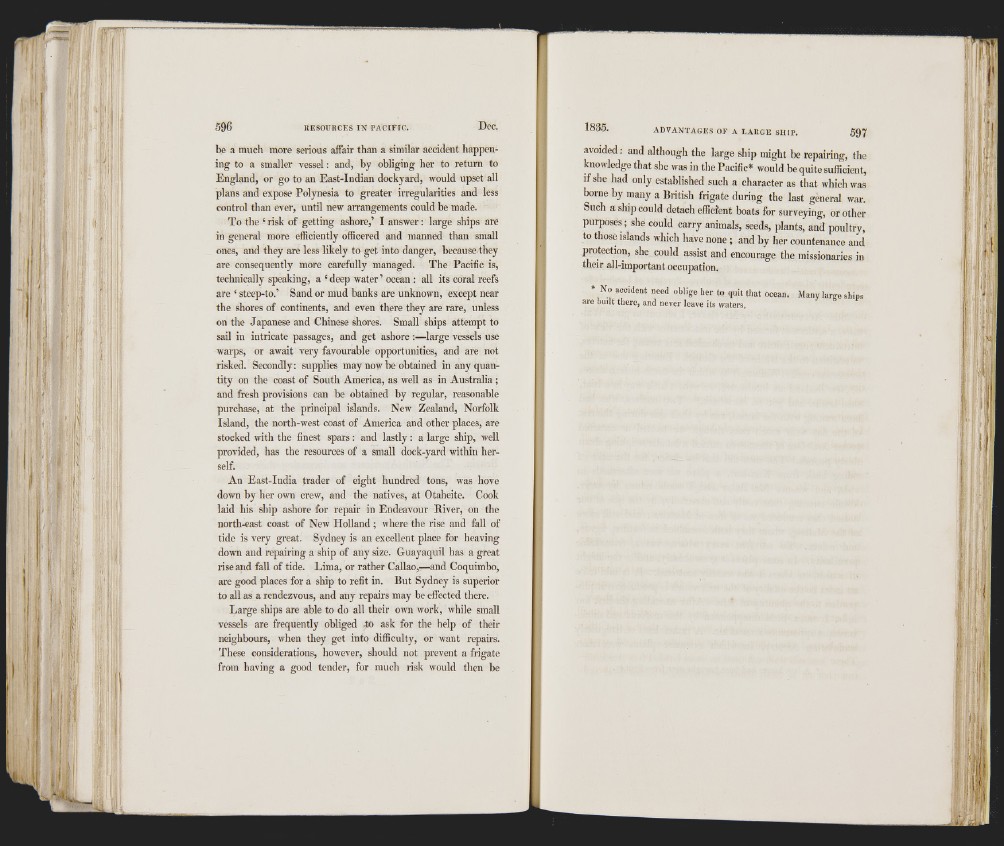
i.h
596
be a much more serious affair than a similar accident happening
to a smaller vessel : and, by obliging her to return to
England, or go to an East-Indian dockyard, would upset all
plans and expose Polynesia to greater irregularities and less
control than ever, until new arrangements could be made.
To the ‘ risk of getting ashore,’ I answer : large ships are
in general more efficiently officered and manned than small
ones, and they are less likely to get into danger, because they
are consequently more carefully managed. The Pacific is,
technically speaking, a ‘ deep water ’ ocean ; all its coral reefs
are ‘ steep-to.’ Sand or mud banks are unknown, except near
the shores of continents, and even there they are rare, unless
on the Japanese and Chinese shores. Small ships attempt to
sail in intricate passages, and get ashore :—large vessels use
warps, or await very favourable opportunities, and are not
risked. Secondly; supplies may now be obtained in any quantity
on the coast of South America, as well as in Australia ;
and fresh provisions can be obtained by regular, reasonable
purchase, at the principal islands. New Zealand, Norfolk
Island, the north-west coast of America and other places, are
stocked with the finest spars : and lastly : a large ship, well
provided, has the resources of a small dock-yard within herself
.A
n East-India trader of eight hundred tons, was hove
down by her own crew, and the natives, at Otalieite. Cook
laid his ship ashore for repair in Endeavour River, on the
north-east coast of New Holland ; where the rise and fall of
tide is very great. Sydney is an excellent place for heaving
down and repairing a ship of any size. Guayaquil has a great
rise and fall of tide. Lima, or rather Callao,—and Coquimbo,
are good places for a ship to refit in. But Sydney is superior
to all as a rendezvous, and any repairs may be effected there.
Large ships are able to do all their oivn work, while small
vessels are frequently obliged Jo ask for the help of their
neighbours, when they get into difficulty, or want repairs.
These considerations, however, should not prevent a frigate
from having a good tender, for much risk would then be
avoided: and although the large ship might be repairing, the
knowledge that she was in the Pacific* would be quite sufficient,
if she had only established such a character as that which was
borne by many a British frigate during the last general war.
Such a ship could detach efficient boats for surveying, or other
purposes; she could carry animals, seeds, plants, and poultry,
to those islands which have none ; and by her countenance and
protection, she could assist and encourage the missionaries in
their all-important occupation.
* No accident need oblige her to quit that ocean. Many large ships
are built there, and never leave its waters.
'.M à
S i;
'■'il
i; |1
%
l i l t